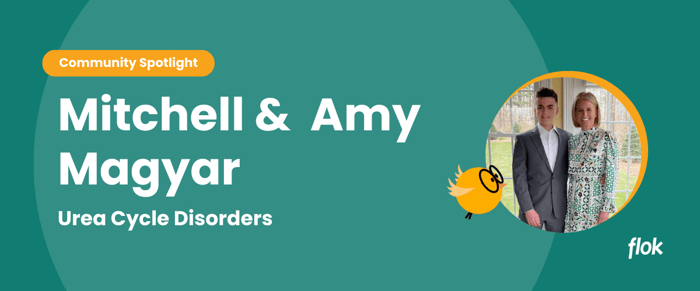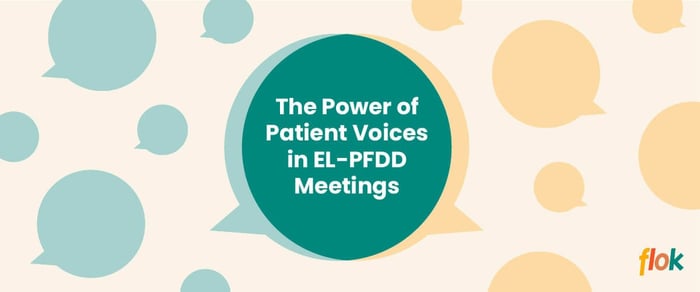Argininosuccinic Aciduria
Like many 17-year-olds, Mitchell Magyar is busy preparing for life after high school. He is diving into SAT prep, touring college campuses, and exploring potential career paths. But for Mitchell, reaching these milestones was no easy feat. He is navigating life after a liver transplant while also managing Argininosuccinic Aciduria (ASA), a rare Urea Cycle Disorder.
His mother Amy shares their incredible journey — from diagnosis, through liver transplant, to the present— and how the flok app is supporting Mitchell’s transition toward greater independence.
Navigating the Unknown
As Mitchell enters young adulthood, he and Amy look back on the challenges they’ve faced. He was diagnosed with ASA shortly after birth, thanks to Connecticut's newborn screening test. Because of feeding difficulties as a baby, doctors recommended a g-tube for direct nutrition to his stomach. He has relied on tube feeds ever since.
Mitchell’s early years involved close management of his specialized medical formula and supplements to lower his blood ammonia levels. Amy recalls the delicate balance of making sure he received enough nutrition while also preventing a metabolic crisis. With ASA, even minor sicknesses like a cold can lead to hyperammonemia, where high levels of ammonia in the blood become toxic. Early symptoms can range from headaches to vomiting — or remain entirely invisible.
In fifth grade, a serious episode of hyperammonemia led to hospitalization, and the challenges only grew from there. Frequent ammonia spikes, an enlarged liver, and increased pain signaled the need for a liver transplant. Just 31 days after being listed for transplant, Mitchell underwent a life-changing surgery at 13 years old.
A New Chapter: Life After Transplant
Mitchell’s transplant solved many of his metabolic concerns. It allowed him to have a regular tube-fed diet without the risk of ammonia build-up in his blood. However, it brought a new set of challenges. He started taking medications to prevent organ rejection and watching for rejection symptoms. Amy notes the parallels between ASA management and transplant care — “With a liver transplant, many things are just as unknown as with a urea cycle disorder. Rejection symptoms can be sneaky and hidden like a metabolic crisis.”
The last few years have been an adjustment period for both Mitchell and Amy. While his diet has expanded, he still takes arginine supplements, which his body cannot naturally produce, and continues tube feeds as his primary source of nutrition. Consistency is key to his health. Missing a dose of his transplant medications could lead to severe complications.
Despite these daily care responsibilities, Mitchell is flourishing. He loves biking, spending time with friends, working out with a personal trainer, and volunteering at a local farm. These activities bring him joy and balance while maintaining his health.
The Role of Technology: The flok App
Mitchell describes the flok app as a vital tool in his daily care. “It allows me to easily log and monitor my daily medications, supplements, and formula, ensuring that I stay on top of my treatment plan.”
The app not only gives Mitchell a sense of control, but also supports remote care collaboration. Amy explains its value as he prepares to live on his own — “When blood draw results come back, I can make adjustments in real-time in the flok app, so Mitchell takes the right amount and keeps track of each dose.” When they are apart, the flok app will help Mitchell manage his own health, while giving Amy peace of mind.
Looking to the Future
As Mitchell plans for college and dreams of one day building a family, he wonders how ASA and his liver transplant will shape his course. “There are not many kids like me, who were picked up on the newborn screening, managed throughout their lives, and then transplanted. So, I am curious to see what the future holds for me.”
Amy shares these thoughts, hoping for more ASA research to answer their questions. "It’s crucial to have a better understanding of these conditions, and we can’t learn if we don’t share information." Mitchell has participated in UCD research studies since infancy, contributing valuable insights for the medical community and blazing a trail for children born after him.
Resilience
Even with the uncertainties, both Amy and Mitchell remain optimistic. Amy shares the joy of seeing her son thrive, and Mitchell is grateful for personal growth from his journey.
“Living with ASA has its challenges and requires constant attention, but it has also taught me resilience and adaptability. I want people to know that neither ASA or my transplant define who I am. With the right support and resources, such as the flok app, it's possible to lead a fulfilling and active life.”



